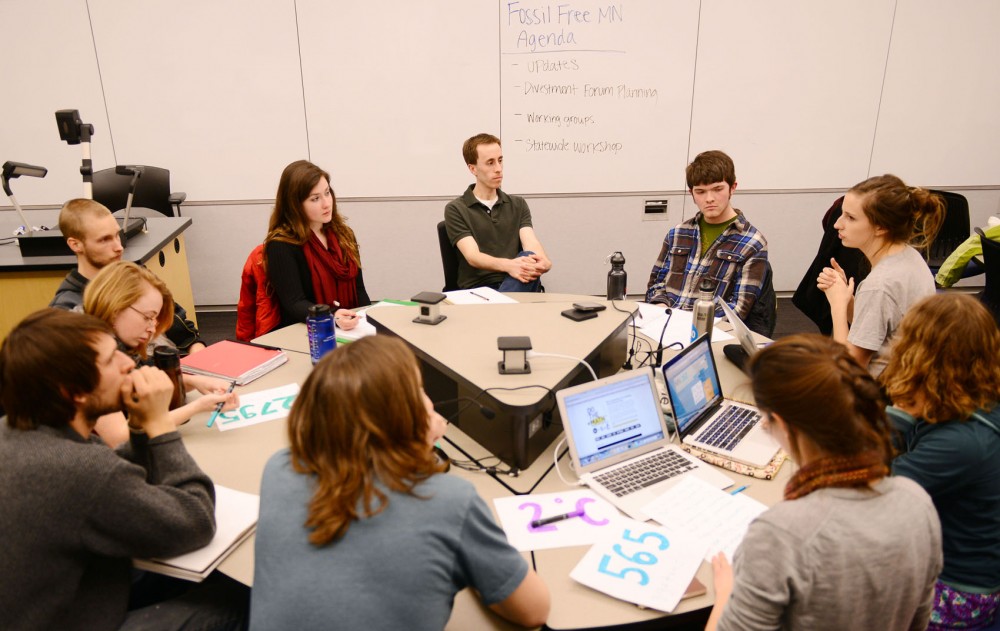Students are pressuring the Board of Regents to get rid of the University of Minnesota’s investments in the fossil fuel industry.
Two University student groups — Fossil Free Minnesota and Eco-Conscious Campus — are joining a state and national push for colleges to remove their investments in fossil fuel companies.
The groups want regents to approve a freeze in any new investments in fossil fuel companies and divest from existing funds in the next five years.
Environmentalist Bill McKibben’s November lecture at the University about the fossil fuel industry’s role in global warming spurred the push.
After McKibben’s speech, the University hosted a conference about steps students could take against the fossil fuel industry.
“We literally just formed right then and there,” said Seth Schramm, a member of Fossil Free Minnesota.
The group started meeting regularly in the weeks following the conference, discussing ways to approach University administrators about removing the school’s endowment from fossil fuel companies, said public relations senior Eliza Grames, an officer for Fossil Free Minnesota.
She said the group hopes the University administration will be responsive to its requests.
“We’re looking forward to hearing what they have to say because we know that the University’s been a leader in sustainability initiatives in the past,” Grames said.
Eco-Conscious Campus, formerly Campus Beyond Coal, will support divestment efforts by meeting with regents and University President Eric Kaler, said club President Trent Blomberg.
He said the group refocused on divestment after successfully reducing the University’s dependency on coal by getting the Southeast Steam Plant to sign a coal reduction agreement in 2011.
“The [University] needs to look at its investments,” Blomberg said. “If they are trying to teach us to be more sustainable and to be the future of the world, they need to promote that with their investments as well.”
He said it won’t be easy to get the University to divest.
“They aren’t going to take it lightly at all,” Blomberg said. “Unfortunately, climate change is still controversial in some people’s eyes, and that’ll be a major hurdle.”
Fossil Free Minnesota is organizing a forum to educate people about fossil fuel divestment, Grames said, which will allow people to discuss the effectiveness of divestment as a strategy for social change.
“There are some people who aren’t as convinced as we are that divestment is a great idea,” Grames said. “We want to hear their side of it and kind of get people talking about it and bring climate change higher up on the public agenda.”
Schramm said since the University has a large endowment, persuading the administration to remove it from fossil fuel companies would set an example for smaller schools.
“If we can divest,” he said, “I think that’s kind of a shining light to pretty much anywhere else in the country.”
Cross-campus divestment
Other students across the Twin Cities have started similar efforts to push their schools’ administrations to stop investing in fossil fuel companies.
Fossil Fuel Free Macalester, a divestment group at Macalester College in St. Paul, has reached out to students with petitions, events and guest columns in the school’s newspaper, all in the effort of educating them on the issue, Macalester biology sophomore Rick Beckel said.
Beckel said the group hopes to get a quarter of the college’s 2,000 students to sign the petition before asking its student government to support the campaign. It will then meet with administrators about the school’s endowment.
Since most of Macalester’s investments are tied up in mutual funds, it’s difficult to pinpoint a platform for divestment, Beckel said. But the student group will continue to research potential areas to target.
“As long as Macalester is teaching us stuff about sustainability … and talking about being responsible in the global community, we should be taking action not only on campus on sustainability initiatives, but also within our financial portfolio,” Beckel said.
Students from Minneapolis Community and Technical College have begun a similar campaign to educate students about divesting from fossil fuel, said Treana Mayer, a member of MCTC 350, the group leading the campaign.
Mayer said because MCTC doesn’t hold any individual investments in fossil fuel companies, students at the college plan to speak with legislators about removing fossil fuel holdings across the Minnesota State Colleges and Universities system.
Mayer said bringing the divestment campaign to the state level reflects climate change’s role in students’ futures.
“It’s kind of ridiculous to plan to better your future if there won’t be a livable future for it to come to fruition,” she said. “Trying to take the money out of the business that would prevent us from having a livable future is really important.”


